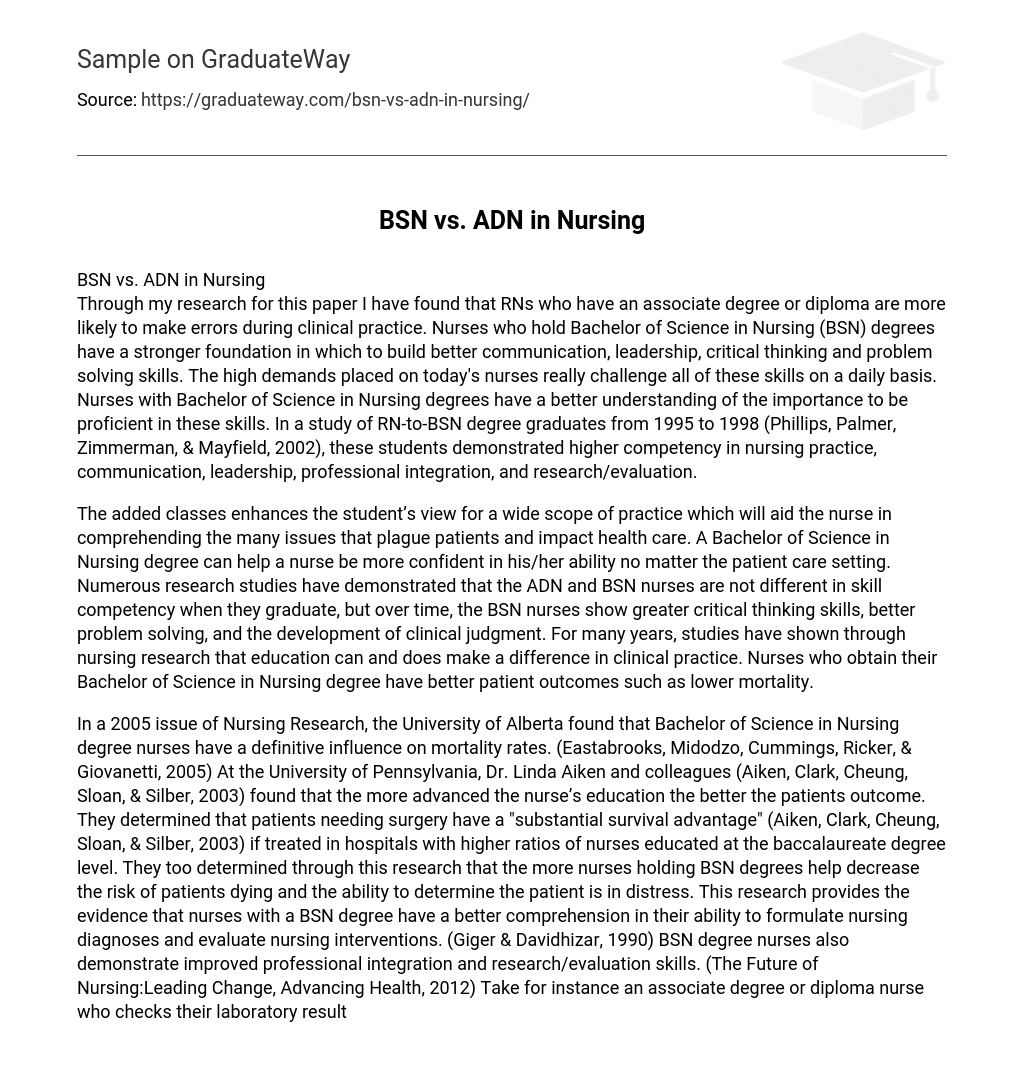Research has shown that Registered Nurses (RNs) who have an associate degree or diploma are more likely to make mistakes in a clinical setting. In contrast, nurses with a Bachelor of Science in Nursing (BSN) have a stronger knowledge base, which improves their abilities in communication, leadership, critical thinking, and problem-solving. Nursing is a challenging field that constantly tests these skills, and BSN nurses understand the importance of expertise in these areas. A study conducted on RN-to-BSN graduates between 1995 and 1998 found that these students demonstrated higher levels of proficiency in nursing practice, communication, leadership, professional integration, and research/evaluation (Phillips et al., 2002).
The additional classes improve the student’s perspective and understanding of various patient issues and their impact on healthcare. A Bachelor of Science in Nursing degree can boost a nurse’s confidence regardless of the care setting. Multiple research studies indicate that ADN and BSN nurses exhibit similar skill competency upon graduation. However, BSN nurses demonstrate improved critical thinking, problem-solving, and clinical judgment over time. Numerous nursing research studies have consistently shown that education plays a significant role in clinical practice. Nurses who earn a Bachelor of Science in Nursing degree achieve better patient outcomes, resulting in lower mortality rates.
According to a study published in Nursing Research in 2005, nurses with a Bachelor of Science in Nursing degree have a significant impact on mortality rates (Eastabrooks, Midodzo, Cummings, Ricker, & Giovanetti, 2005). Similarly, Dr. Linda Aiken and her colleagues conducted a study at the University of Pennsylvania in 2003 and found that patients have better outcomes when cared for by nurses with advanced education (Aiken, Clark, Cheung, Sloan, & Silber, 2003). The researchers also discovered that hospitals with higher numbers of nurses holding baccalaureate degrees have better survival rates for surgical patients. In addition to this, an increased presence of BSN-educated nurses can help reduce the risk of patient mortality and identify signs of distress.
This research indicates that nurses who have earned a BSN degree have a better comprehension of developing nursing diagnoses and evaluating nursing interventions (Giger & Davidhizar, 1990). Additionally, BSN degree nurses demonstrate improved professional integration and research/evaluation skills compared to associate degree or diploma nurses (The Future of Nursing: Leading Change, Advancing Health, 2012). A concrete example is their superior capability in interpreting and assessing patients’ laboratory results.
The nurse discovers that the patient has high potassium and contacts the doctor, who informs her that high potassium is normal for patients on dialysis. If the nurse had thoroughly reviewed the patient’s medical history and documentation from the doctor, she would have known that the patient is on dialysis. With a bachelor of science in nursing degree, the nurse would possess the critical thinking skills necessary to recognize this as an expected finding in this type of patient. This example emphasizes why nurses with an associate degree or diploma should pursue further education to obtain a bachelor of science in nursing degree. Ultimately, I believe that a nurse with an associate degree or diploma does not make poor decisions. However, without the comprehensive insight provided by a bachelor’s degree, they may not possess the same level of critical thinking abilities.
Enhancing nurses’ education will strengthen their skills in assessing and caring for patients, thereby increasing confidence in handling emergencies and improving patient outcomes. Knowledge of evidence-based practice is essential for nursing staff to provide current and effective care. Research demonstrates that obtaining a Bachelor of Science degree in Nursing is crucial for achieving optimal patient results.
References
- Aiken, L. H., Clark, S. P., Cheung, R. B., Sloan, D. M., & Silber, J. H. (2003). Educational levels of hospital nurses and surgical patient mortality. Journal of the American Medical Association, 290, 1617-1623. Retrieved from http://www.massnursing.org/MACN_July05.pdf
- Eastabrooks, C. A., Midodzo, W. K., Cummings, G. C., Ricker, K. L., & Giovanetti, P. (2005, March/April). The impact of hospital nursing characteristics on 30-day mortality. Nursing Research, 54(2), 72-84. http://dx.doi.org/http://www.aacn.nche.edu/media-relations/NursingWorkforce.pdf
- Giger, J. N., & Davidhizar, R. E. (1990). Conceptual and theoretical approaches to patient care: associate versus baccalaureate degree prepared nurses. Journal of Advanced Nursing, 15(9), 1009-1015. Retrieved from http://www.massnursing.org/MACN_July05.pdf
- Phillips, C. Y., Palmer, C. V., Zimmerman, B. J., & Mayfield, M. (2002). Professional Development: assuring growth of RN-to-BSN students. Journal of Nursing Education, 41(6), 282-283. Retrieved from http://www.aacn.nche.edu/media-relations/EdImpact.pdf
- The Future of Nursng: Leading Change, Advancing Health. (2012). Retrieved from http://www.aacn.nche.edu/government-affairs/IOMFactSheet.pdf





